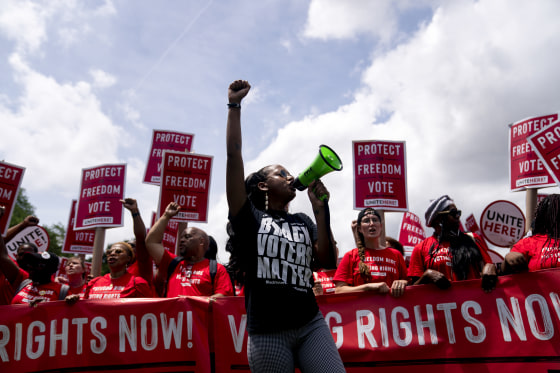By many accounts, the 2022 midterm elections will be the first “referendum” on Democrats after more than a year of fighting to fulfill President Biden’s agenda. Key issues will flip-flop, polling will be variable and turnout will be uncertain.
As reporters gear up to cover these elections, I have a message for those who have any interest in conveying the whole story: Please, for the love of God, stop focusing solely on white women.
When media coverage focuses on white women instead of women as a whole or the issues we all care about, it plays into the patriarchy’s playbook.
The 2021 Virginia governor’s race was the latest example of why this hyperfocused reporting is a problem. In response to Republican gains across the country, outlets published article after article about how white women voted, pundits discussed the issues that motivated them and opinion pieces argued about what Democrats failed to do to woo them into the fold.
The full story paints a much different picture. A diverse group of Virginians voted in that election, and each of their votes influenced the outcome. However, much of the news coverage would have everyone believe that white women single-handedly decided the election — and that their votes were far more important than those of the roughly 400,000 women of color who cast their ballots.
In fact, Supermajority’s internal analysis of coverage, between Sept. 20, 2021, and Nov. 19, 2021, of the Virginia and New Jersey gubernatorial elections shows that the phrase “white women” appeared nearly 43 percent more than either “black women” or “women of color.” Women in America are up to their eyeballs in this stuff, and they’re walking away with a warped impression that some women matter more than others.
When reporters fail to communicate the collective power of women’s votes fully and clearly, the resulting coverage divides and disempowers women. As it has too often been written, the conversation undermines the important progress that has been led by women of color, who have created a coalition of voters from all races, ethnicities and backgrounds that win elections.
Coverage of the 2022 midterm elections needs to reflect that fact. In 2020, a diverse coalition of women carried Joe Biden to victory. Fifty-five percent of us voted for Biden, outvoting the 50 percent of men who cast their ballots for Trump. Women of all races and ethnicities — not just white women — changed our country’s direction.
In Virginia, Terry McAuliffe was competitive in the gubernatorial race because he won 53 percent of women voters, thanks to an overwhelming 86 percent of Black women, 75 percent of Latinas and 43 percent of white women. The focus on the 57 percent of white women who voted for Glenn Youngkin, who won by only 2 percentage points, undermines the collective power of how women actually voted in Virginia and implies that women — instead of the politics, policies and dare I say, politicians who fail us — are to blame.
A close race has different implications than a resounding defeat. We already know the 2022 midterm elections will be close. Every vote will count. Turnout will determine the elections and the course of events that follow. While it’s true that not all white women have joined our multiracial coalition, we don’t need all white women to win. Instead of perpetuating efforts to divide women, we need to fight against the rampant and systemic efforts to undermine women by advancing racial and economic justice.
Women are the supermajority of voters in America, and we’re united in our shared values and energized by hope for solutions to the issues that affect us all.
Women are the supermajority of voters in America, and we’re united in our shared values and energized by hope for solutions to the issues that affect us all. When asked by the YWCA if issues such as health care coverage, protection from discrimination and domestic violence, as well as paid leave, should be legislative priorities, an overwhelming majority of women agreed that each is important or very important. Ninety percent of women said equal pay was important or very important, 89 percent said the same for paid family and medical leave, and 77 percent said they were in favor of protecting Roe v. Wade, which gives women the right to safe and legal abortion care.
We’re sick of making cents on the dollar. We’re tired of politicians haggling over whether we really need paid leave to take care of our families. We’re done with the government refusing our rights over our own bodies through absurd restrictions on our reproductive freedom, such as mandatory waiting periods and state-mandated counseling.
These are the issues that bring women together regardless of our race and despite our differences. They are the issues that dominate conversations around kitchen tables across the country. And they are the issues that drive women to the voting booths.
When media coverage focuses on white women instead of women as a whole or the issues we all care about, it plays into the patriarchy’s playbook, reinforcing the notion that more divides women than unites us and elevates white women over women of color. These narratives keep women from exercising our individual and collective power to build a world where our lives, bodies, work and families are valued. Every news story that advances this trap sows seeds of doubt in women’s minds about their ability to make an impact.
Of course, I’m not asking that journalists abandon covering newsworthy developments or interesting electoral insights. White women voting against their interests is a story, but it’s not the only one worth talking about. I’m asking that journalists tell the whole story, not just white women’s part of it.
Because in our democracy, every American woman—regardless of her age, race, background or anything else—has the sacred right to vote. And reporters play a critical role in protecting our democracy. For everyone’s sake, the Fourth Estate needs to get it right.



